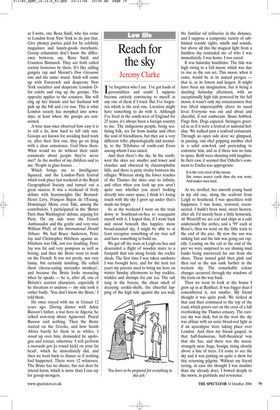Reach for the sky
Jeremy Clarke
I’ve forgotten who I am. I’ve got loads of personalities and could I suppose become entirely convincing to myself in any one of them if I tried. But I’ve forgotten which is the real one. Location might have something to do with it. Although I’ve lived in the south-west of England for 25 years, it’s always been a foreign country to me. The indigenous people, being seafaring folk, are far from insular and often the soul of friendliness, but they are a very different tribe, physiologically and mentally, to the Trilobates of south-east Essex among whom I was raised.
And then there’s the sky. In the southwest the skies are smaller and lower and cloudier and obscured by claustrophobic hills, and there is petty rivalry between the villages. Whereas along the lower reaches of the Thames the skies soar to infinity, and often when you look up you aren’t quite sure whether you aren’t looking directly into outer space. I think it’s losing touch with the sky I grew up under that’s made me forget.
So at the weekend I went on the train down to Southend-on-Sea to reacquaint myself with it. I hoped that, if I went back and stood beneath this happier, more broad-minded sky, I might be able to at least recognise something of my true self and have something to build on.
We got off the train at Leigh-on-Sea and descended a flight of wooden stairs to a footpath that ran along beside the cockle sheds. The first time I was taken outdoors I was brought here, and for the next ten years my parents used to bring me here on winter Sunday afternoons to buy cockles, winkles and shrimps for our tea. The salt tang in the breeze, the clean smell of decaying cockle-shells, the cheerful lapping of the high tide against the sea wall, the familiar oil refineries in the distance, and I suppose a composite variety of subliminal seaside sights, smells and sounds, but above all this the magical light from a limitless sky reminded me of who I was immediately. I was home. I was cured.
It was Saturday lunchtime. The tide was high owing to a full moon, which was due to rise as the sun set. This moon, when it came, would be at its annual perigee that is, at its lowest and largest. It might have been my imagination, but it being a dazzling Saturday afternoon, with an exceptionally high tide powered by the full moon, it wasn’t only my consciousness that was lifted imperceptibly above its usual level. Everyone was out and about and cheerful, if not exuberant. Boats bobbed. Flags flew. Dogs capered. Strangers greeted us as if it were a festival or national holiday. We walked past a seafood restaurant. Through an open side door we glimpsed, in passing, one chef gripping another chef in a solid arm-lock and pretending to sodomise him, and as if there was no time to spare. Both were shouting with laughter. In their case it seemed that Othello’s comment to Emilia was appropriate:
It is the very error of the moon; She comes nearer earth than she was wont, And makes men mad.
As we strolled, her smooth young hand in my old one, along the seafront from Leigh to Southend, I was speechless with happiness. I was home, restored, reconnected. I hadn’t been mad, sweet heaven, after all. I’d merely been a little homesick. At Westcliff we ate cod and chips at a café underneath the arches, and a ‘99’ each at Rossi’s, then we went on the little train to the end of the pier. By now the sun was sinking fast and the tide was going out rapidly. Leaning on the rail at the end of the pier we were surprised to see shining mud banks being uncovered far out from the shore. These turned gold then pink and then red as the sun sank further in the western sky. The remarkable colour changes occurred through the windows of the train on the way back.
Then we went to look at the house I grew up in at Benfleet. It was bigger than I remembered it, not smaller. My friend thought it was quite posh. We looked at that and then continued to the top of the road, which peters out on the crest of a hill overlooking the Thames estuary. The eastern sky was dark, but in the west the sky was ablaze with an eerie blood-red light as if an apocalypse were taking place over London. And then my friend gasped, in that half-humorous, half-theatrical way that she has, and there was the moon, strangely near, huge, benign, rising silently above a line of trees. I’d come to see the sky and it was putting on quite a show for this returning pilgrim. Without my friend seeing, in case she thought I was madder than she already does, I bowed deeply to the moon, in gratitude and reverence.


































































































 Previous page
Previous page